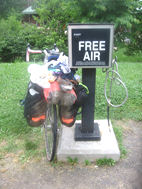 While so many people fixate on e-book piracy, I’m more excited about something else—writers and publishers making money off “free” in appropriate circumstances.
While so many people fixate on e-book piracy, I’m more excited about something else—writers and publishers making money off “free” in appropriate circumstances.
Just the other day, a novel of mine benefited this way.
How? Well, I offer a free audio of several chapters of The Solomon Scandals—a reading that Tom Peters, a librarian, kindly made in his spare time for a blind friend of ours. Yep. Many would say that still more of the book should be on the open Web in MP3, and it might happen in the future.
But meanwhile a busy professor in a history-related discipline has already emailed me to inquire if the entire novel is available to him in audio. The professor is considering Scandals for as an assignment in his course, and he wants to audition the full book while commuting.
Luckily I was in a position to oblige him with the other audios, and I’m thinking ahead. What if my publisher let me make free MP3s available to the students the professor assigned Scandals? They, too, might like to enjoy Scandals during commutes, or maybe jogs or treadmill sessions, if the professor goes ahead. Why should I force them to buy the book twice, in different formats?
The limits of ‘free’
Mind you, I don’t see “free” as a panacea for the whole book industry. As e-book displays improve, will free downloads really be that great at promoting paper editions? What about writers like me who are relying in part on revenue from e-book versions, which, in Scandals’ case, happens to be the main show right now despite the existence of a trade paperback?
I suppose some would say, “Well, the paid version in E just can include extras that the free version doesn’t?” But I don’t know if that’ll work for every title even if I know “free” and “paid” can often co-exist. So I’m still in favor of keeping the option of outright sales of the full e-book in file format (nondownloadable Google displays could be a different issue).
Given the challenges that tiny publishers face with large chains, it may be too damn hard to buy Scandals and other small-press in person, and Net-based bookstores can go only so far, whether the medium is E or P. At least with E, you can enjoy your purchase almost immediately. See why I’m so protective of E sales?
Freebie successes via Google
But that’s just one situation. What about the book samples that Google is putting online with authorization from publishers? Here’s an excerpt from a Boston Globe story by assistant business editor D.C. Denison, a TeleRead reader and WiFi booster:
The majority of publishers in the program allow Google to preview 20 percent of each book. Google monitors Internet traffic patterns to prevent users from logging in multiple times and cobbling together the entire contents of a book.
Google also provides links to the publisher’s online bookstore, if there is one, and a half dozen other online retailers, like Amazon.com.
Partner publishers get weekly reports from Google detailing the number of times that a book’s content is viewed. For many publishers, these “book views’’ have been rising steadily since May 2007, when book search results were added to the standard Google.com search results.
Langevin said that Galbraith’s “The Great Crash 1929’’ generated “zero’’ views for July and August 2008. In September 2008, as the collapse of Lehman Brothers caused the US economy to start teetering, book views rose to 628. By October, the views rocketed to 22,897, as Internet users started searching for words and concepts that were well represented in the book, although the number of views did subside later.
Image: CC-licensed photo from Padraic.
































This is something we’ve been thinking a lot about at Coral Press, and it’s definitely valid that you’re questioning the concept of “free.” I think it’s a matter of keeping an eye on the market and on competitors to see what kind of innovative ways they’re tweaking this concept of “free” and either one-up them or work with them. Dog-eat-dog, you know, but we still have to keep our integrity, which is why I think your example with the professor is an interesting example.